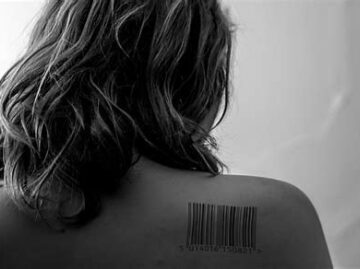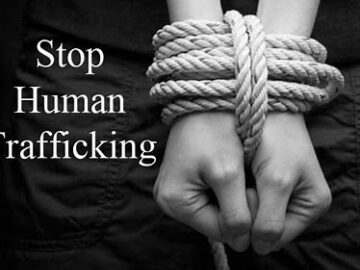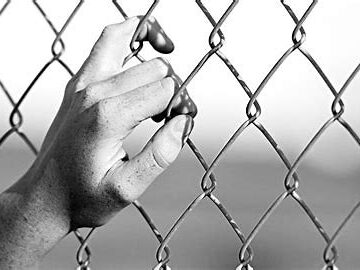Alicija
short film
‘Alicija’ is the story of a young girl who, upon turning eighteen, leaves behind her family home in Poland to follow her dreams… and finds herself living a nightmare – trapped in the dark world of human trafficking. As she awaits her fate, in a sparse bedroom in the UK, she clings to the memories of who used to be… and the life she once lived…
In this film, we are tell a story, but for over 35 million people around the world human trafficking is a fact. By making this film we are hoping to raise awareness of this important issue; and to encourage people to join the fight against it.
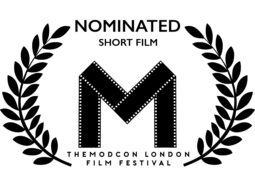
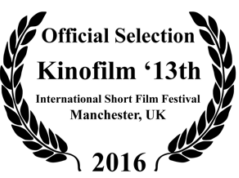
Why did you make this film?
Back in 2013 Becky & I became involved with an anti-trafficking organisation called IJM(UK) and we ended up creating ‘The It’s Not Fair’ - a theatre production highlighting the issue of modern-day slavery. This has toured nationally and it has been brilliant to be able to connect people with both IJM(UK) and ‘Stop the Traffik’. It’s a something that’s really stirred our hearts and so it seemed natural to make it the subject of our next film project.Was it a hard subject to deal with? I think all the time that we were making the film we were aware that our ‘fiction’ was very much an everyday reality for some people. The challenge was to tell a story that was authentic, but without being sensationalised; that was authentic and honest, but without resorting to shock tactics.
We’re really grateful to the support of some of the different anti-trafficking organisations here in Manchester for their help and advice throughout the process.
What do you hope to achieve from this project?
We want to raise awareness of the situation. We want people to be informed, to understand what’s going on – the sheer scale of the problem. I guess most of all we would want people to feel outraged, inspired and challenged to do something about it; to get involved and help to make a difference. I guess, ultimately, we’d love audiences to connect with some of the anti-trafficking organisations out there and support the amazing work they’re doing to rescue people.
Why make a drama rather than a documentary?
Story is such a powerful medium and connects sometimes in a way that can be deeper than with purely factual information. People connect with people. We wanted the audience to feel as though they get to know Alicija – see her with her friends and family, understand what she wants from life,
what makes her tick – and I think than when something terrible happens to a person you know it registers on an all-together different level.In some ways the scale of human trafficking can be too big (35.8 million) to get your head around - when you think of the sheer numbers involved. But we can connect with one human being...
I guess we also wanted to create an immediacy to the situation; that trafficking isn’t just something that happens to ‘other people’ ‘elsewhere’. It can happen anywhere... to anyone...
The film ends on a note of hopelessness – do you think that there is any hope for someone in that sort of situation?
There are people and organisations doing fantastic work, on a number of different levels to bring this crime to an end. The scale of it, internationally, is mind-boggling and can be quite intimidating... but it’s that old adage of ‘better to light a candle than curse the darkness’. People are getting rescued... lives are being restored... My hope is that audiences will be inspired to get involved with the fight and become help make a difference themselves…
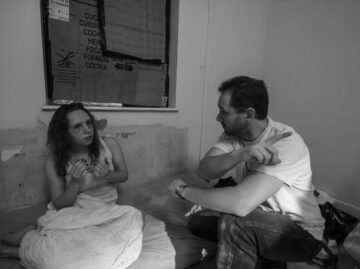

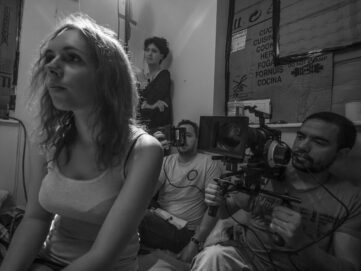
“Human trafficking is the fastest-growing international crime.”
The UN Office on Drugs and Crime
There are an estimated 35.8 million slaves in the world today—more than any other time in history.After drug dealing, human trafficking -both sex trafficking and trafficking for forced labour- is tied with the illegal arms industry as the second largest criminal industry in the world today, and it is the fastest growing.Worldwide, there are nearly two million children in the commercial sex trade.
• Children below the age of 18 years represent between 40 to 50% of all forced labor victims.
• There are an estimated 600,000 to 800,000 children, women and men trafficked across international borders annually.Approximately 80 percent of human trafficking victims are women and girls, and up to 50 percent are minors.
The total market value of illicit human trafficking is estimated to be in excess of $32 billion.Human trafficking is such a massive and hugely pressing problem.However there are a number of groups and organisations doing incredible work, on various of different levels to bring this crime to an end. In the midst of the grim statistics, there are still stories of hope: people are getting rescued, lives are being restored.
For further information about human trafficking please go to: www.modernslavery.co.uk
“You may choose to look the other way but you can never say again that you did not know.”
William Wilberforce
